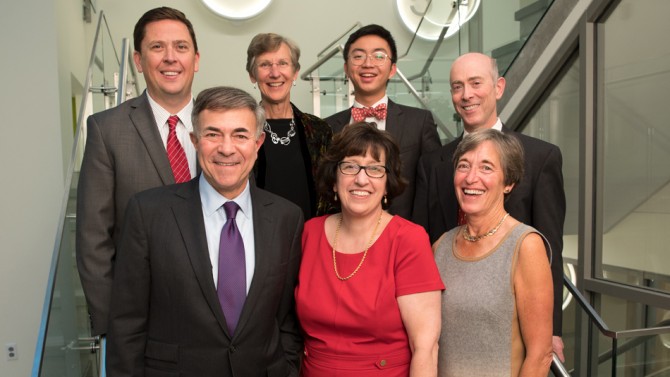
Cornell Health
Cornell Health dedication highlights vision, generosity, student well-being
By Nancy Doolittle
The dedication of Cornell Health Oct. 20 was more than the celebration and tour of a renovated and greatly expanded building. It was the realization of a vision of comprehensive, integrated health services for students and of public health promotion for the campus community.
That vision was shared by three former campus leaders who each have part of the new facility named in their honor, noted Robert S. Harrison ’76, chairman of the Cornell Board of Trustees: Dr. Janet Corson-Rikert, former executive director of University Health Services, who “set the gold standard for how campuses across the country should deliver health care services”; Susan Murphy ’73, Ph.D. ’94, former vice president for student and academic services, who was “relentless” in the name of student health; and “physician-president” Dr. David Skorton, Cornell’s 12th president, who was “responsible for elevating student health to become a core tenet of Cornell’s mission.”
The new Cornell Health, whose groundbreaking was in May 2015, increases the building’s space from 25,000 to 52,000 square feet, improving access to care for a student body that has doubled in size since the original Gannett clinic opened in the 1950s.
The building includes multidisciplinary suites and collaborative work spaces; integrates medical and mental health services and provides meeting rooms for group counseling; increases the number and size of exam rooms; provides confidential clinician offices; and offers an expanded pharmacy and a new home for Student Disability Services.
“I am so grateful to the many generous alumni and friends who understood the importance of this project and stepped up to meet the need,” said Cornell President Martha E. Pollack. “I’m very proud of the dramatic upgrade and expansion of our health facilities that is enabling our dedicated staff to provide more services, more quickly, more effectively, to our large student body. These services are vital to our students’ health and well-being and, in turn, to their academic success.”
Pollack thanked Harrison for championing the project and for the leadership gift he and his wife, Jane, made during the project’s planning stages. She also highlighted the generosity of Andrew and Margaret Paul, Howard and Abby Milstein, and Nancy Meinig and the late Peter Meinig, chairman emeritus of the board of trustees, all longtime supporters of Cornell “who have made a difference for our students, faculty and staff in multiple ways and with great generosity.”
Pollack expressed her appreciation that Cornell Health is “a partner in our quest to ensure that we [provide] an environment in which all of our students, faculty and staff feel included and valued.” Students know that at Cornell Health they can speak with empathic professionals from diverse backgrounds who are devoted to helping them, she said.
Student trustee Dustin Liu ’19 gave examples of that attention to the individual by recalling experiences of students who benefited from the care and support they received from Cornell Health, and he thanked all those “whose contributions have led to this moment.”
Among those are architect Grace Chiang ’80, B.Arch. ’81, and the Chiang O’Brien architectural designers, said Ryan Lombardi, vice president for student and campus life, who also thanked Peter Trowbridge, Cornell landscape architecture professor, for his work on the natural areas adjacent to the building. Lombardi drew special attention to Nianne Van Fleet, director of operations and, for the past 30 years, a registered nurse with Cornell Health, for coordinating the internal logistics of the renovation and expansion.
Dr. Kent Bullis, executive director of Cornell Health, noted that since the new building opened in June, the 220 staff have welcomed thousands of Cornell students seeking care for injuries and illnesses, counseling, accommodations for a disability, vaccinations, prescriptions, answers to insurance questions, or medical clearance for sports participation; trained the student staff of Residential Programs and the West Campus House System in supporting the health of students; and hosted a flu shot clinic attended by more than 1,600 Cornellians.
“This beautiful, thoughtfully designed space has done so much to energize our staff, enhance our services for students and improve their experience of care,” Bullis said. “We stand – humbly and gratefully – on the shoulders of visionaries, of extraordinarily generous benefactors, of Cornellians. Without a doubt, the view from where I stand is truly inspiring.”
Media Contact
Get Cornell news delivered right to your inbox.
Subscribe